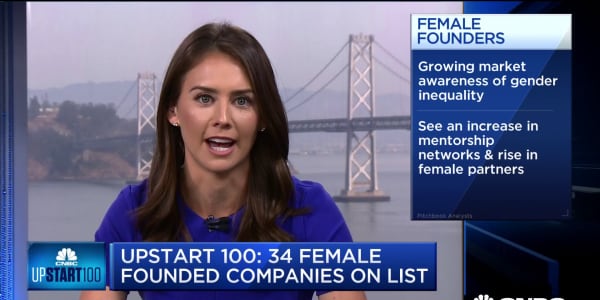To most American shoppers, there's nothing remarkable about a red onion in the produce aisle at the closest big box retailer.
But it's a huge victory for Ashley King-Bischof's technology. King-Bischof is the CEO and co-founder of Markit Opportunity, a Nairobi, Kenya-based start-up that connects small farms to big corporate buyers and exporters.
It's a big untapped market opportunity, hence the company's name. Family farms are about 90 percent of all farms worldwide, according to United Nations research. In Kenya 75 percent of workers make all or part of their livelihood from agriculture, which constitutes 18 percent of the nation's economy, according to the United States Agency for International Development.
Not only does Markit Opportunity improve the quality of the goods at your local box store, it elevates the earning potential of Kenyans, especially women. The company is currently in the process of incorporating their platform with one of the largest exporters in Africa to sell fine green beans, a huge crop for export in Kenya.
Markit Opportunity provides three different technologies. Farmers get a text-messaging product that lets them exchange simple numerical codes with agents for each transaction — similar to how TV shows ask you to text a short numerical code to vote for your favorite singer. Agents get an Android app to manage those communications with farmers, and buyers, like big box retailers, have access to real-time inventory and transaction from small farmers.
The tools help level the playing field between small local farms and large established farms when international buyers look to buy crops responsibly.
"At the beginning of the chain are people, often women, that are working incredibly hard, that aren't getting to keep much of the value they create, because it's a complex supply chain," said Ryan Ross, a program director at the Halcyon Incubator in Washington, D.C., which supported Markit Opportunity. "This could increase the quality of life for an incredible amount of people in the area."
More transparency between buyers and farmers
Before products like Markit, retailers bought produce through a circuitous system of buyers, brokers and other middlemen. Farmers had no visibility into the process, so they were often selling their crops for less money than they could have gotten — and far less than the price retailers are willing to pay.
"Their whole livelihoods are dependent on their crops," King-Bischof said. Sugarcane, maize, potatoes and bananas are among Kenya's top crops, according to the UN. "Storage facilities, transportation are all locked up in the investments of their farm. Working capital is a big concern for them."
From the other end, the old system made it difficult for stores and consumers to verify the source of their produce and determine that it met the right international safety standards.
"In Kenya .... [many] farms are small farms in very rural areas without a lot of infrastructure — access to power, running water, roads. It's a fragmented system geographically," King-Bischof said.
The penetration of mobile phone technology, on the other hand, is about 88 percent in Kenya, according to government data.
"We are using technology that is accessible to them," King-Bischof said.
Now agents can text farmers to ensure that their crops are in demand, free of spoilage and using the right levels of pesticides for their end market, said King-Bischof. And farmers can have a long-term relationship with steady prices, or pick up contracting gigs when they can. The platform also provides farmers with access to financial services like loans and insurance.
Hustle and connections
Ross said King-Bischof's willingness to get her hands dirty is a big driver of the company's success.
"With Ashley, before she even got to the program, I would see pictures of her on Facebook in the back of a vehicle shipping onions," Ross said. "That's the kind of hustle you need. It's incredible to see how hands-on she was able to get at an early stage."
King-Bischof, in turn, credits much of the company's rapid success to the connections she made at Halcyon, which houses eight social entrepreneurs for five months at a time in Washington and provides them with stipends and support from Amazon Web Services, Deloitte, KPMG and other major business brands.
"It's a really great example of public-private partnership," said Kate Goodall, the chief operating officer of the S&R Foundation, which operates the incubator. "It provides fellows with headspace so you can breathe and focus on what you're doing. And something we call facilitated serendipity: access, which is really about connecting with great problem solvers."
That's also where King-Bischof met co-founder Zeluis Teixeira, or Ze for short, who is using his expertise as a former bank executive to strike global deals for Markit Opportunity. Teixeira, who has lived in developing nations around the world and has familial roots in agriculture, has a vision for how Markit Opportunity can scale globally.
"With Ze, he has an ability to pivot, do it so seamlessly, and not get down about leaving a lot of work on the table," said Ross, the director of Halcyon.
The two have dramatically different backgrounds. King-Bischof was inspired to create the company after combining knowledge from her Ivy League economics degree, work consulting for NGOs and experience at companies like Yelp and Kiva.org, where she worked in the field in Cameroon. But the pair have one important quality in common, said Ross.
"They have resilience," he said. "It's something you can't just put on an application. You see it in the day to day."







